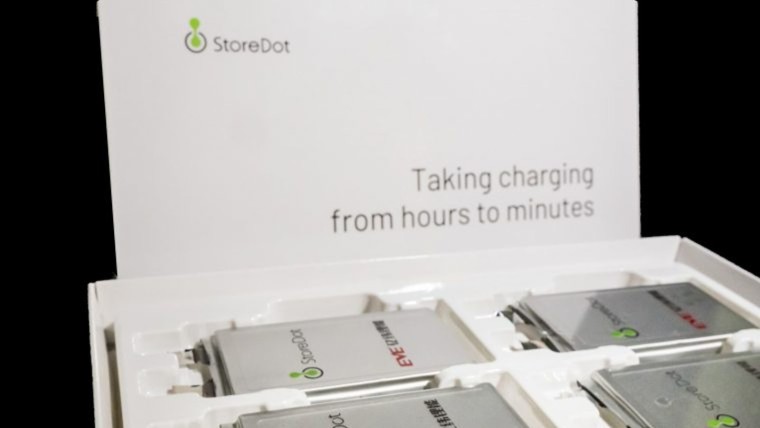
StoreDot, an Israeli company focusing on battery technology for electric vehicles, has announced (via Sky News) the successful production of new fast-charging batteries that can be fully charged in just five minutes. In partnership with China-based EVE Energy, the company managed to produce 1,000 units of the battery in China, using existing production lines for lithium-ion batteries at one of EVE's factories, meaning production costs shouldn't increase on account of new production equipment. This achievement also proves the commercial viability of the technology, StoreDot says.
Back in December, CEO Doron Myersdorf talked about the project and explained that the fast charging speeds can be achieved courtesy of the replacement of graphite in the batteries' anode with metalloids such as silicon. Silicon can be used to either improve energy density - thus, capacity - or the charging speeds, but not both, and StoreDot is focused on the latter. As such, the company is giving up some of the battery's range - roughly 10% to 15% - in exchange for fast charging. It's not clear, however, just how long these batteries would last, since a clear point of comparison isn't given.
Myersdorf believes that charging anxiety - the fear of taking too long to charging an electric vehicle or having to wait for a charger to be free - is the biggest hurdle to EV adoption, which is why that's StoreDot's focus. Most chargers can take upwards of one hour to charge a typical car battery, and there's also a good chance that charging stations will be occupied when customers need to charge up. The battery technology allows it to charge faster without requiring a different charger, so charging points wouldn't have to be designed specifically for it, thus charging speeds would see a bump across the board, reducing wait times for users.
StoreDot has been working on technology like this for a while. Back in 2019, it demonstrated a two-wheeled vehicle charging up in just minutes, and last year, it did the same with a commercial drone, both of which were world firsts. This time around, though, it's doing it with a standalone battery that's expected to be commercially viable. The first-generation samples are more so proof of concept that the technology is scalable enough to be widely adopted, and they use germanium instead of graphite. Second-generation samples are planned for the end of the year, and StoreDot hopes to move to silicon for those. However, full commercialization isn't expected until 2024 or 2025.

















5 Comments - Add comment